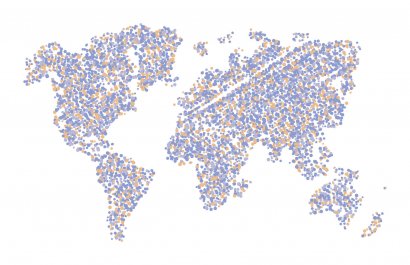Social science par excellence that studies the relationships between people and between them and society
 Sociology is the social science par excellence that deals with the study of relationships between individuals and the laws that regulate them within the framework of human societies..
Sociology is the social science par excellence that deals with the study of relationships between individuals and the laws that regulate them within the framework of human societies..
The object of study of it are basically social groupsThese are understood as the set of individuals who coexist grouped in different types of human associations within the framework of a community. Then, Sociology will deal with analyzing the various internal forms of organization that they may present, the relationships that their components maintain with each other and with the system within which they are inserted, and finally the degree of cohesion that exists in the social structure of which they are part.
Men marked by society and vice versa
Men are born into a certain society that will be the one that will mark the action of its components and also its destiny, because in that influence it exerts on its members it instills in them values, ways of behaving, beliefs. But also the man with those movements that he makes will influence society itself and cause the famous social changes.
Revolutions such as the industrial and the French were some of those most marked and relevant changes that left strong marks on societies.
Millennial interest in the social but Auguste Comte formally develops sociology
But of course, we know all this concretely today that Sociology is already a science, however, since a long time before it became such and there was a name that designated it, descriptions were already being made and the different peoples were studied, the relationships that its components maintained with each other and with their customs. For example, the thinker Herodotus, as early as the 5th century BC. he had carried out concrete and complete studies on different human populations and their more traditional ways of relating.
However, we would have to wait several more centuries for the question to be formalized and everyone talks about sociology as the social science par excellence.
Meanwhile, it would be the Philosopher Auguste Comte, who in the 19th century when he presented his course on Positive Philosophy would finally give the final form to the concept of Sociology that we all have today.
Then, it was Comte who imposed the name of sociology to call the science whose focuses of study were social events. Observation was installed as a method of analysis of the same and it would be through it that the various phenomena that occur in the social plane could be identified and from them formulated the corresponding theories and laws.
As a consequence, the method that Comte imposed to study the social fabric was the same that the natural sciences had been using, is that he also liked to call it social physics.
It would only be in the middle of the mentioned century that Sociology would be consolidated as a totally autonomous science; and later, in the following century, the 20th, the different schools and currents would begin to appear that would propose their particular points of view on the different sociological questions of interest.
Paradigms
Among the main sociological proposals or paradigms are the Functionalism (confirms that social institutions are instruments that have been developed collectively, expressly to satisfy the needs of society), Marxism (absolute maker of the Theory of Social Conflict), the Symbolic Interactionism (highlights the symbolic character of social action), the Structuralism (highlighting the social structure) and the Systems Theory (considers the Society as a social system).
Approaches. Study methods
Sociology can be studied through two approaches, the qualitative, which supposes detailed descriptions of the situations, behaviors and people and that if necessary includes the story of the participants, in the first person; and on the other hand the quantitative, which implies characteristics and variables that can be expressed through numerical values and that also allow finding possible relationships through statistical analysis.
On the other hand, sociology has a variety of branches within its field of action, politics, educational, urban, art, religion, industrial, among others.
Meanwhile, the methods it applies include various techniques and tools, observation as mentioned above, data collection through surveys and interviews and finally all this is reflected in graphs to be able to mark statistical trends on the aspect of study or in focus.
And finally we must speak of a division within social science in macro sociology on the one hand that deals with analyzing social relations at a national or superstate level, and on the other hand, micro sociology that interprets the interrelation between individuals and influence. of the social field in them.









